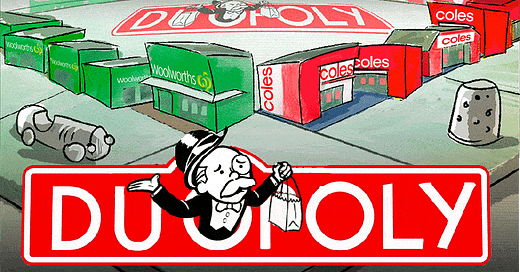In their recently released Supermarket Inquiry1 report the Australian Competition and Consumer Commission (ACCC) took 414 pages to tell us what we already knew. We are being ripped off by Coles and Woolworths. The report is unambiguous that what we have with the grocery duopoly is market failure2: “In economic terms, this is an oligopolistic market structure in which Coles and Woolworths have limited incentive to compete vigorously with each other on price.” Despite the cost of living crisis the profits of the big grocery chains remain among the highest in the world.
The big two also benefit from market control over suppliers, a condition the ACCC calls ‘Monopsony’. “In economics, a monopsony is a market structure in which a single buyer substantially controls the market as the major purchaser of goods and services offered by many would-be sellers.” I suppose since there are two it should be called an oligopsony. Whatever you want to call it the grocery cartel is in a position to tighten the screws on suppliers and consumers. From the report:
Factors such as Coles and Woolworths purchasing a large share of production of the relevant product and high perishability of the product tend to enhance Coles’ and Woolworths’ buyer power and can give them monopsony power in dealing with those suppliers. This is most commonly the case for fresh produce suppliers.
In addition to market control the grocery giants have increased their competative advantage by engaging in what is called ‘land banking’. This is when they buy property for supermarket development and don’t develop it. Coles and Woolworths own 150 already scarce undeveloped sites. Of the 260 developed and undeveloped properties purchased between them since 2019 the ACCC was aware of 14 and some of them only through third parties. This admission is indicative of the loose oversight exercised by the regulator. One would think expansion of an existing oligopoly would be of interest to any functional consumer watchdog and not all that difficult to discover. Testimony from Metcash who own the IGA chain of stores said:
There would be, you know, plenty of circumstances every year…where there are sites that we may identify as being suitable for an IGA to open and then, when we investigate, we found that those sites are unavailable because they’ve been land banked by one of the chains.
So what is the regulator going to do. Not much. From the Supermarket Inquiry:
Coles and Woolworths’ dominance of the sector seems set to continue. While they face ongoing and evolving competitive challenges on many fronts, their entrenched position in an oligopolistic market means substantial pro-competitive departures from the status quo are unlikely in the foreseeable future.
That was the read of the markets too. The report came out on the 21st.
They’re not worried about a disruption to their winning business strategy.
What you will not read in the ACCC’s 400-page report is that institutional fund managers like Blackrock, State Street, Vanguard and Fidelity appear in the top 10 ten shareholders list of both Woolworths and Coles. An oligopoly/ monopsony in a monopoly you might say. Next time you wince at the cash register remember who you’re paying.
These big fund managers employ an ingenious method of controlling boards. They buy just enough of a companies stock that would cause the share price to tank if they were to suddenly dump them. Since board bonuses attached to stock performance CEOs like Woolworth’s boss Amanda Bardwell with $3.5 million on the line, can be considered a fairly known quantity.
People should be angry about this market failure, but what are they going to do? Stop eating. This is the pernicious nature of monopoly — the economic policy of limiting choice.
The take away message is that we are on our own. Not the goverment, nor the ACCC will be doing anything when it comes to food cost and quality. If you doubt what I say have a look at the ACCCs pathetic recommendations. There is no willing regulator to protect the consumer against the incursions of big money. That’s not to say there won’t be more reports and little court cases, the show must go on, but inflation of food prices to feed corporate profits is hard-baked into the system.
Australian Competition and Consumer Commission. Feb 25. Supermarket Inquiry. Available from: https://www.accc.gov.au/system/files/supermarkets-inquiry_1.pdf
Oliver Heydorn has written an excellent piece on market failure as a result of the dysfunctional financial system.







Well done again, Will.
It is 'the investors' ... we are supposed to applaud them as they SCREW us!